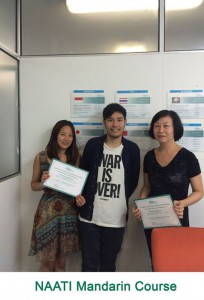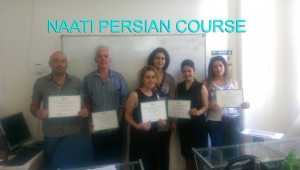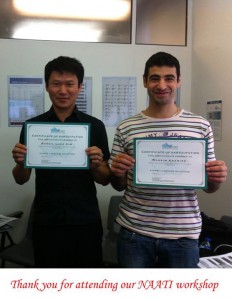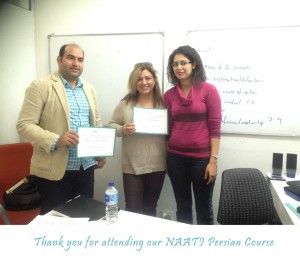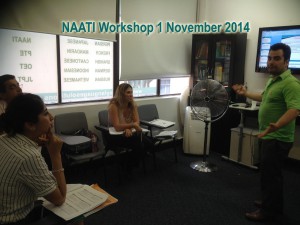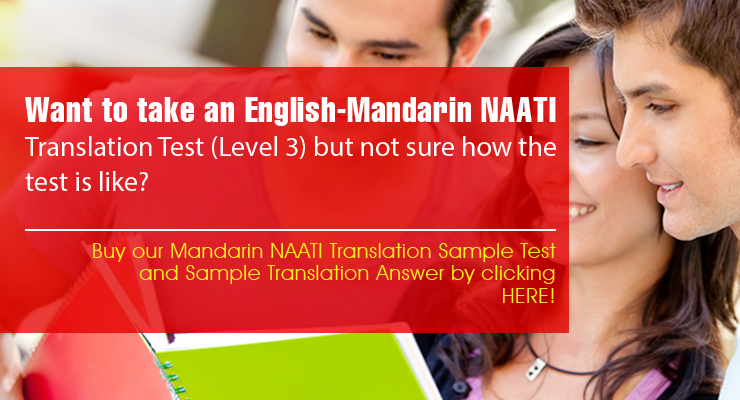
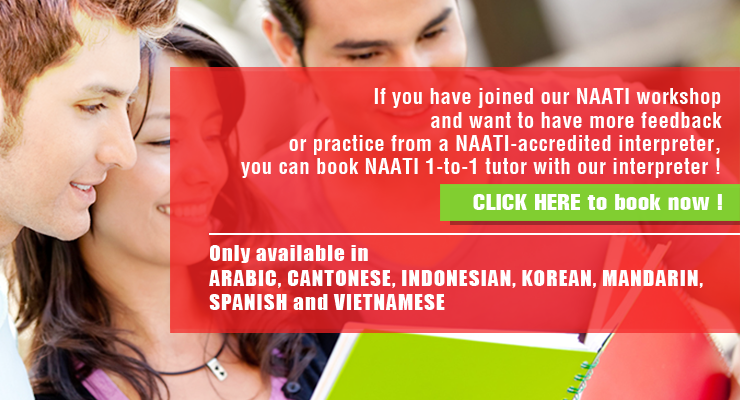
-
Improving your notetaking techniques and public speaking skills required for interpreting
-
Ethics and requirements in working as a professional (or paraprofessional) interpreter in Australia
-
Cultural competence and how to use that in interpreting
-
Some common types of errors in interpreting from English to LOTE(Language Other Than English)
-
Some major interpreting techniques to convey a speech from one language to the target speech in another language
-
Practice interpreting skills in class and receive feedback.
Course Objective:
• Students will know the ethics and professional requirements to work as a professional interpreter in Australia.
• Students will understand some major techniques to convey one source speech from English to the target speech in another language (LOTE)
• Students are provided with knowledge about common types of interpreting errors to avoid making them in NAATI Test
Who should attend?
• University Students who want to gain a better understanding about interpreting techniques
• University Students who intend to take a NAATI Test and have a rough understanding about the test
• Interpreting researchers/tutors
Special notes for this workshop:
- This workshop is to help students prepare for the NAATI Test for Interpreter at Professional or Paraprofessional Interpreter Level and from English to LOTE (Language Other Than English)
- The instructional language is English and all the theories and the tips are given in English, so even if you take the NAATI test in your native language, the workshop still helps you to grasp some basic information about translation theories and translation/interpreting techniques.
- All tips, techniques will be provided and explained in English.
- Please check for more information about your language and, how to register for your NAATI examination at http://www.naati.com.au/ before you come to class.
Requirement: Current IELTS speaking & listening score ≥ 6.5
Important notice:
- This course is not run by NAATI and we are not affiliated with NAATI nor do we represent NAATI.
- Completing this course does not automatically grant you with NAATI accreditation.
- SLS only help you, through this NAATI preparation course, to prepare your interpreting / translation techniques for your exam.
- After you finish the course, you will need to contact NAATI independently (Tel: 1300 557 470) to book your NAATI Test. You are only granted with NAATI accreditation after you pass the test.
Saturday, 15 August 2015 from 10:00am- 4:30pm
Where: Suite 302, 363 Pitt St, Sydney 2000
Class size: 6 – 12 Students
Cost: $140+GST (including all free training materials)
Contact us at info@sydneylanguagesolutions.com.au or
call us at 02 9283 9892 for more information
Program:
- Ethics and standards in interpreting professions
- Major interpreting techniques (in English) and examples of these interpreting techniques
- Interpreting processes and possible errors (comprehension errors, linguistic errors, translation errors) in each process
- Reviews and Questions.
Note:
- The program of each workshop may be slightly adjusted to fit the individual needs of the students in class.
- Please bring your dictionary (from English to LOTE and from LOTE to English) to the workshop
- Please nominate your language to the SLS Enrolment Officer when you book for your course.
Book this WorkshopDownload Info
Book Online with your details and pay by Cash, Cheque, Direct Deposit to SLS bank account. Please contact us atinfo@sydneylanguagesolutions.com.au or call us at 02 9283 9892 for more information
“Thank you for everything! I like the fact that I could ask questions specific to the test format and conditions in the workshop!”
(NAATI Translation & Interpreting Workshop Participant – September 2012)
“It was a good workshop. Na is a very good teacher!” (NAATI Translation & Interpreting
Workshop Participants – September 2012)
“This workshop is a pathway to the test and I found it to be very helpful!” (NAATI
Translation & Interpreting Workshop Participants – September 2012)
“I came from Canberra to Sydney on Monday and attended your class. It was very
useful and you are one of the best teachers I ever met. It was easy to learn from
you. Thank you.” (Liliana Bogatko – March 2013)
“Extremely good materials were provided. The trainer gave good explanation!”
(NAATI Interpreting Workshop Participants – April 2013)
“The workshop was very informative and the tutor was very knowledgeable.”
(NAATI Interpreting Workshop Participants – April 2013)
“Very useful information, more than my expectation. Very good teaching materials.”
(NAATI Interpreting Workshop Participants – April 2013)
“There was a lot of information about NAATI specifics and practical information given.”
(Andreas Steinwachs – May 2013)
“I liked all of the feedback and the experienced tutor” (Minh Phuong Nguyen – May 2013)
“The tutor was very clear, very detailed. I really enjoyed it. The tutor is energetic.” (Tuan Tio – May 2013)
“The workshop covered all relevant topics. All questions were answered.” (Pari Nathan – May 2013)
“Excellent Course. A lof of topics coverered in just seven hours.” (Fazel Rahman – July 2013)
“I really liked the class, amazing teacher, she gives nice tips.” (Deepshikha Mehta – July 2013)
“I like the class, it is really helpful. Thanks!” (Ali Reza Baturi – July 2013)
“Excellent preparation!” (Thanh Minh Uyen Luu – July 2013)
“The workshop was good in terms of informative material and motivated coach (Anne Ma). I would definitely recommend this course to friends who want to know about NAATI” (Vinh Loc Phung – July 2013)
“It is a very good course. The part about cultural aspects of interpreting is very useful.” (Yan Li – September 2013)
“The quality of the workshop is really rich and informative. I really like the presenter. I appreaciate the presenter’s passion about the workshop. It is very useful and informative. Thanks. ” (NAATI Interpreting Workshop Participants – September 2013)
“Thank you to the presenter as she drew our attention to some practical knowledge of translation errors. Many valuable skills!” (Wasan Odeh – September 2013)
NAATI is the National Accreditation Authority for Translators and Interpreters a
1. Does SLS provide training in NAATI preparation courses for interpreting?
At the moment we provide both the training for translation and interpreting. Besides, we also provide
*Preparation courses for Chinese, Vietnamese,
*NAATI Translation marking services for some languages (Korean, Portugese, Arabic, Spanish, Mandarin, Japanese, Vietnamese) and
*6-hour Preparation Workshops for the interpreting/translation test for all languages.
2. Does the Translation Workshop focus more on theories or practical exercises to improve translation techniques?
The course time is divided equally between translation theories and practising translation skills.We believe that a sufficient knowledge of translation errors will help you to avoid these errors in translating and a good understanding of translating techniques will provide you with different tips and techniques to translate correctly.
3. Does the Interpreting Workshop focus more on interpreting techniques, questions for cultural proficiency or on
practical exercises to improve interpreting techniques?
The course time is divided equally between interpreting theories and practising interpreting skills in pairs with practising transcripts.We believe that a sufficient knowledge of cultural competence and interpreting techniques will help you to improve your interpreting skills. Our workshop will provide you with different practice trascripts, tips and techniques to have confidence in public speaking as well as interpretation skills.
4. Can I just submit my assignment for marking without attending class?
Yes, you can still submit the assignment for marking without attending class. The fee is $350 for the marking of two NAATI Practice Mock Tests (which have a similar format as the real NAATI test) and four translation assignments where you convert English into your native language. The assessors are NAATI-accredited.
Please read our instructions carefully regarding the submission of your assignments and retaining your receipt HERE.
5. Can I book the NAATI-accredited trainer to ask some questions if I only use the assignment marking package?
Yes, you can book the tutor for the fee of $60 per hour to go through your essay (only available for Arabic, Vietnamese, Chinese, Korean and Japanese at the moment).
6. Are the classes conducted in my native language or in English?
In all cases, including your assignments, you will be asked to interpret/translate from English into your native language.
The amendments and comments on your assignment will be given by our NAATI-accredited assessors in English, that is to say, all the training will be in English.
However, in language-specific 18-hour NAATI preparation courses, your trainer will also speak the same native language as you so that you will be able to get extra help if you are not sure of certain expressions in your own language. She/he will also suggest some alternative answers in your native language if there are any errors in your translation.
For example, in the Chinese NAATI preparation courses, most examples will be given in Chinese (your native language) and in the Vietnamese NAATI preparation courses, the examples of translation errors will be given in Vietnamese.
In General Language 6-hour NAATI preparation workshops for all languages that we may organise every two months, we do not specialise in one language. The trainer will speak and train in English; however, the examples of most translation errors will be given in different languages i.e. Arabic, Chinese, Korean, and Vietnamese.
7. What level of language proficiency should I have?
You should have very advanced levels in both languages, not only in English comprehension but also in your native language.
8. Should I take the Translation or Interpretation Test?
If you are good at writing and your native language, you should take the NAATI Translation Test. If you are more confident with public speaking, note taking and are fluent in your language (and English speaking), you should consider NAATI Interpreting Test.
However, please remember being bilingual does not mean you can immediately become a good translator or interpreter.
9. Do I receive a certificate at the end of the course?
We don’t issue a certificate or diploma which will help you with your visa application, but we do issue a Certificate of Participation. The aim of the course is to help you prepare for the actual NAATI test.
10. Why should I study with Sydney Language Solutions?
We are a translation company, so we can provide you with real translation techniques and experiences
– We have a group of professional teachers who are NAATI-accredited.
– We design the mock tests and assignments to help you familiarise yourself with the exam structure.
– We provide precise and focused translation techniques,
– We provide supporting exercises, mock test and a vocabulary list to help you build up your translation skills.
– We are conveniently located in the Sydney CBD.
– We offer a very reasonable price and free training material
11. What is the purpose of the program? a
The program is designed to help university students or other English language learners to know the ethics and professional requirements to work as a professional translator in Australia. Students will understand some major techniques to convey one source text from one language to the target text in another language. Students are provided with knowledge about common types of translation errors to avoid making them in the NAATI Test
12. What is the English level required for the students of the program?
We recommend you should only join this workshop if your current IELTS Score in Writing is at least 6.5 or 7 marks (in Academic Training).
13. Who is suitable to enrol the program?
For those who have achieved 6.5 or 7 in IELTS, this will be an especially suitable program for you. This workshop is also suitable for university students who want to gain a better understanding about translation or students who intend to take a NAATI Test and have a rough understanding about the test.
14. What is the content of the program?
The program is a very student-oriented and flexible language program. Besides the essential Ethics and requirement in working as a professional translator in Australia which will surely be covered in the program, the program will also cater for students’ common types of translation errors in translating from English to another language (depending on the time and resources available). Moreover, the workshop will introduce some major techniques to convey one source text from one language to the target text in another language.
1. Interpretation (Professional Interpreting in the Real World): This book provides a structured syllabus and an overview of interpretation accompanied by exercises in the main aspects of the art. It is meant as a practical guide for interpreters and as a complement to interpreter training programmes. It is particularly useful for students preparing for conference interpreting in international governmental and business settings.
2. Introducing Interpreting Studies: This book is the first of its type, designed to introduce students, researchers and practitioners to the relatively new, and now fast developing, discipline of Interpreting Studies. The book begins by tracing the evolution of the field, reviewing influential concepts, models and methodological approaches, then moves on to consider the main areas of research in interpreting, before reviewing major trends and suggesting areas for further research. Featuring chapter summaries, guides to the main points covered and suggestions for further reading, Franz Pöchhacker’s practical and user-friendly textbook is the definitive map of this important and growing discipline.


